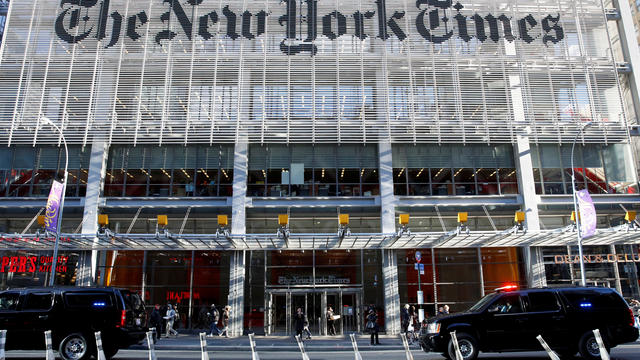New York Times tech workers halt work in escalating union fight

New York Times tech workers halt work in escalating union fight
Hundreds of software engineers and product designers at the New York Times staged a work stoppage Wednesday as part of an escalating battle with the storied newspaper’s management over their push to unionize.
The employees left their jobs at noon and planned to halt work for the rest of the day in a move to draw attention to what they describe as efforts by the media company to hinder the union recognition process.
Tech workers are seeking union recognition for about 600 staffers including product designers, software engineers, developers and product managers. The Times’ roughly 1,300 editorial and business employees are represented by the NewsGuild, a division of the Communication Workers of America.
The Guild first announced the intent to organize tech workers in April and has said that, since then, 70% had signed cards asking to be represented by the union. But instead of voluntarily recognizing the tech workers’ unit, which would have allowed them to begin negotiating, the company pushed for a union election.
The Tech Guild then moved to hold a digital election overseen by the American Arbitration Association, but the Times also declined, preferring to hold an election with the National Labor Relations Board (NLRB) — a slower and more cumbersome process, organizers say.
Earlier this week, the Times pushed back on the size of the proposed bargaining unit, suggesting a unit that would only include engineers and leave out more than 200 workers such as product designers and project managers. That led tech workers to organize the stoppage, according to Guild organizers.
“This was sort of the last straw,” Goran Svorcan, a software engineer who works on the Times’ crossword puzzle app, told CBS MoneyWatch, saying that the Times had refused to recognize the unit and tried to whittle down its size. “Throughout this effort … it feels like the Times has moved the goal posts.”
A Times spokesperson told CBS MoneyWatch the company slowed the process to accommodate what she described as hesitation by some employees over whether to unionize.
“We’ve heard a significant amount of reservations and uncertainty among our technology and digital teams about what a union would mean for them and their teams,” the spokesperson, Danielle Rhoades Ha, said in an email. “This indicates to us that our colleagues want more information in order to determine the best path for their future and want the opportunity to have a vote on the matter, rather than the company making the decision to recognize the proposed new unit.”
“Because a tech-focused unit of this size and scope is unprecedented, there are several questions and critical issues to address in ensuring there is a proper group for bargaining,” she added.
The Guild has also filed a number of complaints with the NLRB, alleging that Times managers have illegally coerced and intimidated workers over their union support. Two workers told CBS MoneyWatch that Times managers asked workers about their support for the union, told some people to remove pro-union messaging from their workplace Slack account and promised some workers improved conditions if they voted against the union. All of these alleged actions violate U.S. labor law.
The Times’ spokesperson denied that the company engaged in unfair labor practices, saying, “While we have not received anything from the NLRB or the union directly about the allegations, we are confident that we are following the letter of the law in this process.”
She added that the company “has a long history of productive relationships with our various unions; we also have a long history of productive employee relationships without unions in many parts of the company.”
Key battle line
The size of a bargaining unit, as well as the timing of an election, are often the subject of negotiation between companies and workers trying to unionize.
“It’s a little bit of warfare,” said Todd Vachon, director of the Labor Education Action Research Network at Rutgers University. “The incentive on the workers’ side is to have the largest number of people who want to have a union as possible. From management’s side it’s about restricting the unit to the smallest possible.”
“In terms of the workers, the bigger the bargaining unit they have, the more power they have,” he said.
Drawing out the process of union recognition also tends to favor employers, Vachon said. Delaying the date of an election gives a company more time to dissuade workers who may be on the fence, or to improve working conditions to persuade employees they don’t need a union. Once a union is recognized, meanwhile, the process of negotiating a contract that addresses worker demands can take years.
Nozlee Samadzadeh, a senior software engineer at the Times who is participating in the work stoppage, said Times’ managers were trying to “create haves and have-nots” to deter the organizing effort.
“We don’t want to live in that world and we’re not going to,” she said. “We’re here for this fight, we are here till the end — all we want is to make the Times a better place and get to the bargaining table.”
Tech workers, including news developers and designers, have become an increasingly important part of the Times’ newsroom, as well as in other media organizations increasingly focused on digital content.
The proposed bargaining group at the Times would be the largest U.S. union of tech workers. The industry, whose workers tend to be dispersed and are often well-paid, has long resisted organized labor. However, a survey by the tech publication Protocol this spring found that roughly half of tech workers are interested in joining a union.



